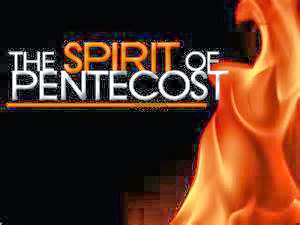THE SPIRIT OF PENTECOST
 1. Introduction
1. Introductiona) The name Pentecost comes from a Greek word which means 'fiftieth'.
b) The festival is often called Pentecost because when the disciples received the Holy Spirit and began to go out and preach about Jesus it was Jewish festival of Pentecost.
c) Pentecost is recognized as the birth of the Christian church. The Apostle Peter preached a sermon which resulted in 3,000 people becoming believers.
2. What has happened on the day of Pentecost in Acts 2:1-4?
a) Then Holy Spirit Comes at Pentecost
i) 1When the day of Pentecost came, they (120 disciples) all together in one place. 2Suddenly a sound like the blowing of a violent wind came from heaven and filled the whole house where they were sitting. 3They saw what seemed to be tongues of fire that separated and came to rest on each of them. 4All of them were filled with the Holy Spirit and began to speak in other tongues as the Spirit enabled them. (Acts 2:1-4 NIV)
b) Exactly 50 days after the resurrection of Christ (April 8) the promises made concerning the Spirit were fulfilled amongst the company of disciples (120 of them) waiting in Jerusalem.
c) This was the commencement of an entirely new work of the Spirit as foretold by the prophets.
d) There were several evidences that the Spirit had come to them.
3. What are the evidences of the visit of the Holy Spirit?
a) Firstly, there was a wind from heaven. A mighty, rushing wind.
i) In both Hebrew and Greek, the word for 'spirit' also means 'wind'. So, it was significant that there should be a mighty rushing wind as a herald (proclamation) of the Spirit's arrival.
ii) Wind speaks of life, power, movement, force, all typical of the Holy Spirit.
b) Secondly, flames of fire.
i) The symbolic fire was also extremely significant. John the Baptist has foretold that Jesus would baptize with 'The Spirit and fire'.
ii) Fire symbolizes purging, cleansing, burning up the chaff (fine-cut hay or straw; anything worthless) and dross (worthless stuff; waste matter).
c) Thirdly, speaking of other tongues, as the Spirit gave them words to say.
i) The evidence that came manifestly after the disciple were filled with the Spirit was that they 'began to speak with tongues as the Spirit gave them utterance'.
ii) There were 120 disciples in the company at that time. We are clearly told that they were ALL filled with the Holy Spirit and clearly, ALL began to speak with tongues.
iii) The clear evidence of every disciple on this occasion was the supernatural given ability to speak in languages that they had never learned.
d) Of the 3 manifestations that occurred that day, only one was later to be seen to be consistently occurring factor accompanying the Baptism in the Spirit - it was the speaking with other tongues.
4. What does God do after Peter and Paul are filled with the Holy Spirit?
a) Peter's shadow brought healing and deliverance
i) 12The apostles performed many signs and wonders among the people. And all the believers used to meet together in Solomon's Colonnade. 13No one else dared join them, even though they were highly regarded by the people. 14Nevertheless, more and more men and women believed in the Lord and were added to their number. 15As a result, people brought the sick into the streets and laid them on beds and mats so that at least Peter's shadow might fall on some of them as he passed by. 16Crowds gathered also from the towns around Jerusalem, bringing their sick and those tormented by impure spirits, and all of them were healed. (Acts 5:12-16 NIV)
b) Handkerchiefs and aprons that touched Paul brought healing and deliverance
i) 11God did extraordinary miracles through Paul, 12so that even handkerchiefs and aprons that had touched him were taken to the sick, and their illnesses were cured and the evil spirits left them. (Acts 19:11, 12 NIV)
5. What would the Lord desire to do in this day of the his favor?
a) 1The Spirit of the Sovereign Lord is on me (Isaiah), because the Lord has anointed me to proclaim good news to the poor. He has sent me to bind up the brokenhearted, to proclaim freedom for the captives and release from darkness for the prisoners, 2to proclaim the year of the Lord's favour and the day of vengeance of our God, to comfort all who mourn, 3and provide for those who grieve in Zion— to bestow on them a crown of beauty instead of ashes, the oil of joy instead of mourning, and a garment of praise instead of a spirit of despair. They will be called oaks of righteousness, a planting of the Lord for the display of his splendor. (Isaiah 61:1-3 NIV)
6. Prayer focus
a) Pray for the baptism (fullness) of the Holy Spirit in our lives so that we can receive boldness and power to witness for him.
b) Pray for God's healing and deliverance so that we could be set free.
c) Pray for God's anointing so to rest upon us so that he can use us for his kingdom purpose.
d) Pray for extraordinary miracles to be released to us tonight so that we would know that God is indeed an extraordinary God. His ways are not common and ordinary.
Comments
Post a Comment